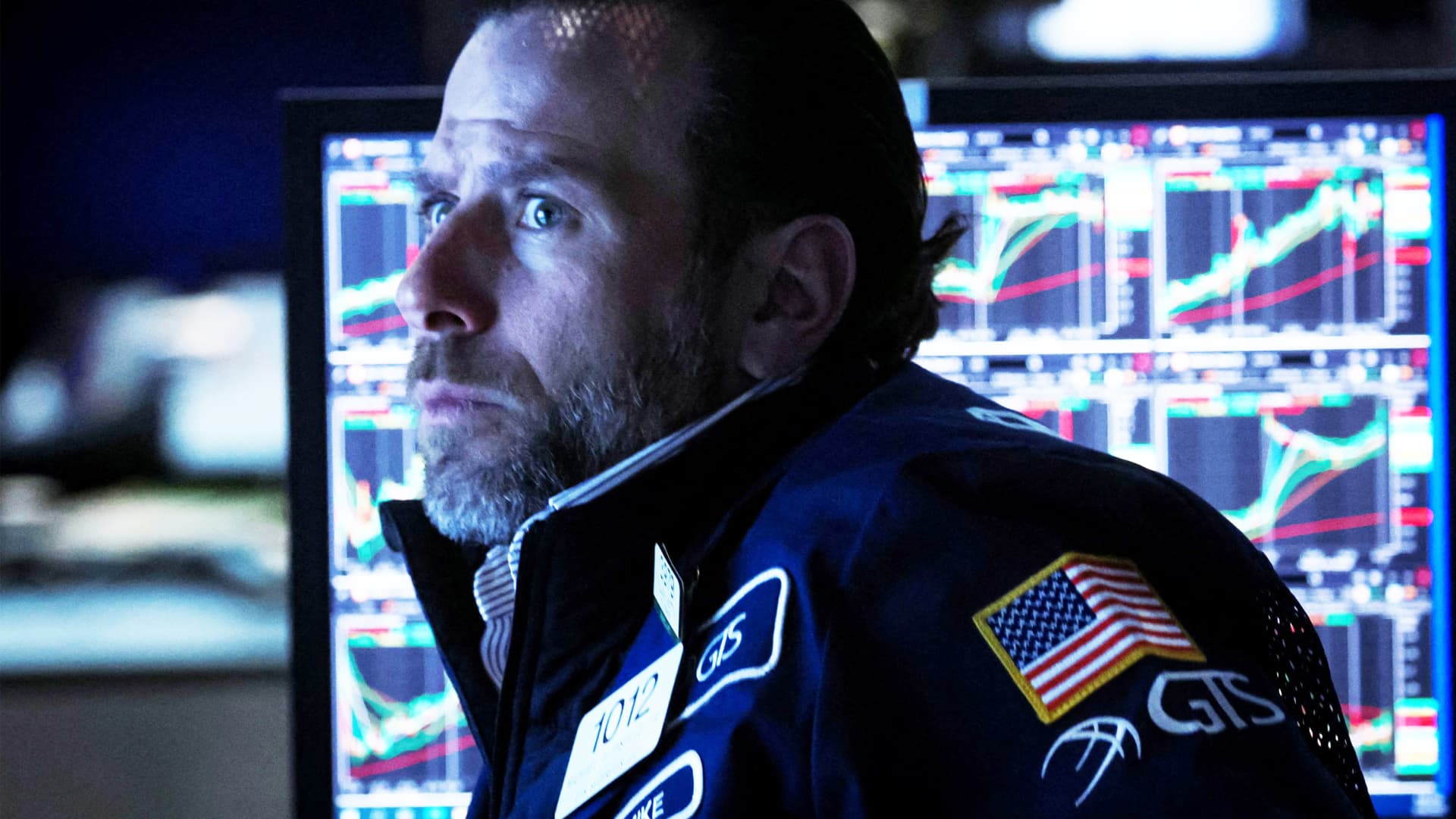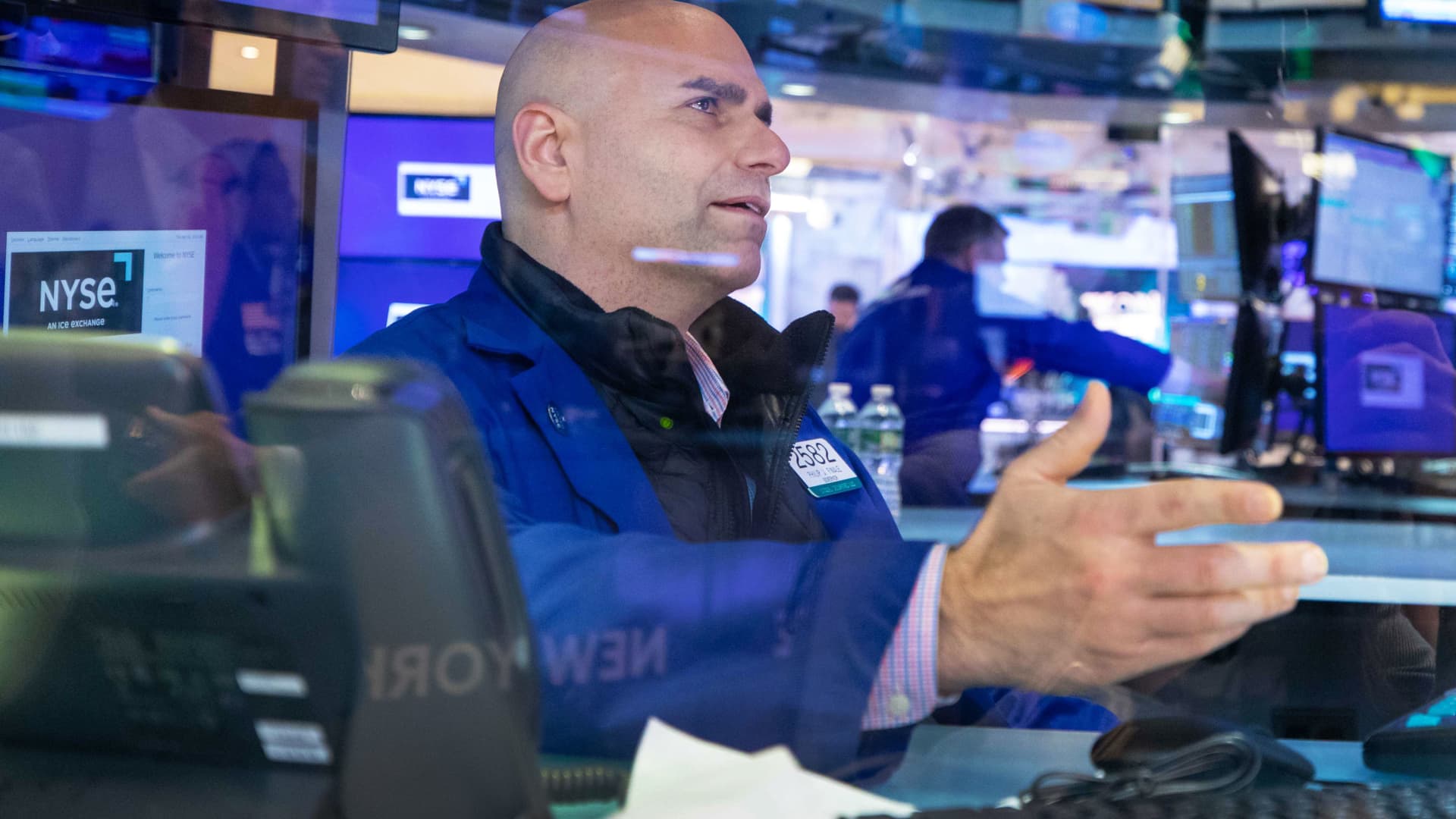Stocks fall for a second day as rates jump, with the Fed set to tighten policy aggressively
Minutes from the Fed's most-recent meeting are slated for release Wednesday afternoon.

Stocks dipped for a second day on Wednesday and rates soared to new heights as investors bet the Federal Reserve is about to aggressively tighten policy to fight inflation, and in turn slow the economy.
The Dow Jones Industrial Average traded 260 points lower, or 0.8%. The S&P 500 slid 1.15%, and the Nasdaq Composite pulled back by 2.5% after shedding about 2.3% on Tuesday.
Investors await minutes from the Fed's most-recent meeting slated for release Wednesday afternoon, which could impact investors' outlook and offer new clues to the Fed's plan to reduce its balance sheet. It comes after comments from Fed officials knocked down stocks on Tuesday. The minutes come from last month's meeting when the central bank raised rates and indicated six more hikes were coming this year.
The 10-year Treasury yield jumped above 2.65% on Wednesday, hitting a three-year high and continuing its rapid climb this week. The rate ended Monday at 2.40%.
Philadelphia Federal Reserve President Patrick Harker said Wednesday that he is "acutely concerned" about rising inflation. His comments come less than a day after Fed Governor Lael Brainard indicated support for higher interest rates and said a "rapid" reduction of the central bank's balance sheet could come as soon as May. Brainard's remarks pushed stocks lower in the previous session.
"It is of paramount importance to get inflation down," Brainard said during a Minneapolis Fed webinar. Brainard has been nominated to be vice chair of the Federal Open Market Committee.
Harker said Wednesday he expects "a series of deliberate, methodical hikes as the year continues and the data evolve." San Francisco Fed President Mary Daly echoed similar sentiments toward inflation on Tuesday.
"What that means for the markets are continued volatility around the uncertainty to higher rates and lower-income cash flow stocks, growth type stocks, probably continuing to get discounted as rates rise," Cliff Corso of Advisors Asset Management told CNBC's "Worldwide Exchange."
Tech shares fell again on Wednesday following Tuesday's losses, as investors rotated out of the group and braced for higher rates to slow the economy. Apple, Microsoft, Amazon and Tesla contributed to the sector's declines and led the Nasdaq to fall again Tuesday.
Meanwhile, Twitter shed 3% after rallying this week amid news that Elon Musk purchased a large stake in the company, and chipmakers Nvidia and Marvell Technology continued their descent on Wednesday, falling about 3%. As the Federal Reserve hikes rates investors have begun searching for stocks with stable profits and shying away from those offering future growth.
Utilities, health care and consumer staples sectors continued to climb Wednesday, with Amgen, Merck and Johnson & Johnson all rising about 2%. Consumer staples such as Walmart and Procter & Gamble also inched slightly higher along with telecom giant Verizon.
With earnings season set to begin this month, Goldman Sachs' David Kostin said Wednesday that stocks with "resilient margins" are better prepared to weather the current environment during an interview with CNBC's "Squawk on the Street." That includes names like Alphabet and Nike which have maintained "high and stable margins" even amid the pandemic.
"Overall, the U.S. equities market maybe has 5% upside from these likes between now and the end of the year," he said. "Should we be going into a recession it will be meaningful downside, but that's not the base case right now."
Meanwhile, investors continued to monitor the situation in Ukraine as both the European Union and the U.S. prepare to slap new sanctions on Russia after evidence emerged of alleged war crimes committed by its military. The sanctions would include a ban on Russian coal imports. (Click here for the latest.)
Crude prices, which have been volatile since the war began, were flat on Wednesday after dipping Tuesday and rising 1% premarket. U.S. oil prices were down about 0.1% at $101.87 per barrel, while international benchmark Brent dipped 0.11% to trade at $106.50 per barrel.

 Tekef
Tekef 
































